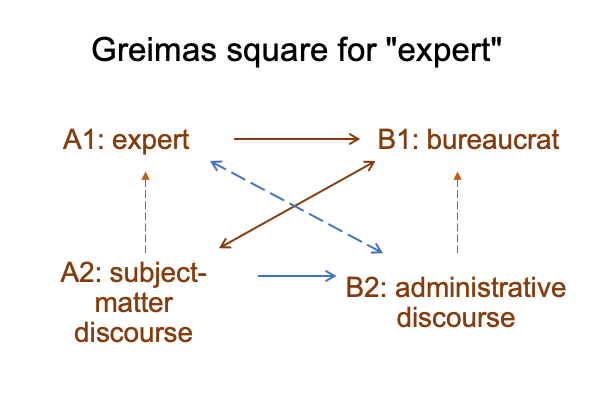0012 From the prior blog, I construct the following Greimas square.

0013 Each word is a placeholder in a system of differences. Clearly, the word, “expert”, is not the same as the word, “bureaucrat”. But, the words are entangled, and therefore, the distinction is subject to manipulation.
0014 What are the key relational features of this distinction?
0015 The first contrast involves rules (A:B contrast in 1 and 2).
The expert knows the rules. The expert does not make the rules. The expert is rule-bound.
The bureaucrat makes and enforces rules. The bureaucrat is rule-following.
Hammer reinforces this contrast by saying that the vast majority of rules governing the everyday lives of Americans are made behind closed doors, by federal bureaucrats. This governance fulfills the vision of progressive President Woodrow Wilson (1856-1924, President 1913-1921). The administrative state has grown for over a century.
0016 The second pair of contradictions (A2 to B1 and B2 to A1) involves performance and discourse.
Expert discourse is bound to subject-matter. The expert knows the rules of the subject-matter. Personal and organizational circumstances are not supposed to influence the expert’s advice. The expert is supposed to be objective (and, ideally, suprasubjective).
Administrative discourse is bound to rule-making and rule-enforcing. The bureaucrat engages in ministerial operations. Bureaucrats tend to be subjective, while pretending to be objective, and intersubjective, while feigning to be suprasubjective. Hammer highlights these points by saying that bureaucrats disdain give-and-take political wranglingand prefer the ministrations of an enlightened clerisy.
0017 What does this imply?
The use of the word, “expert”, by the federal government, for a person in its employ, is misleading.
The word, “bureaucrat”, is not misleading.
0018 Does the slogan, “Trust the experts”, sound as convincing as “Trust the bureaucrats.”?
Here is a good example of deception through the manipulative use of spoken words.
